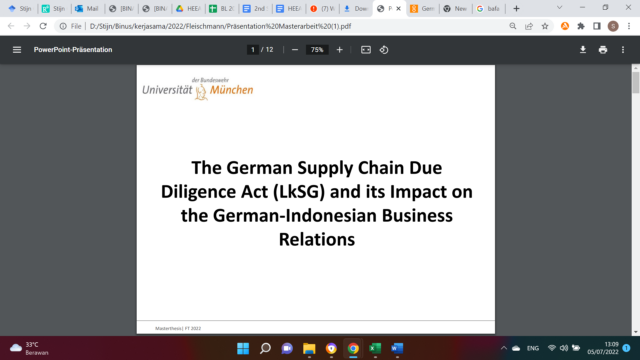VISITING STUDENT JOHANNES FLEISCHMANN PRESENTS MASTER RESEARCH ON NEW GERMAN DUE DILIGENCE LEGISLATION
On Wednesday, August 29th, Johannes Fleischmann, presented his Master research on the potential impact of the new German Due Diligence Law on Indonesian Business. Johannes Fleischmann is a student of the Bundeswehr University Munich who has conducted his Master-thesis research while being based at the BINUS’ Law Study Program, as part of a broader collaboration between the two universities. Present onsite were his Business Law supervisors, Dr. Stijn Cornelis van Huis and Dr. Shidarta, while interested lecturers and students of the Business Law department participated online.
June 2021, Germany adopted the Supply Chain Due Diligence Act that requires companies to comply with human rights and environmental due diligence standards through the entire value chain. Johannes Fleischmann explained that the Due Diligence Law is oriented towards the UN Guiding Principles on Business and Human Rights, yet differs in one essential aspect. While the UN Guiding Principles are based on a voluntary commitment by companies and as such constitute “soft law”, the new German law is “hard” and imposes sanctions to those companies that do not comply with German standards for due diligence. The Federal Parliament of Germany considered that the soft law provisions of the UN Guiding Principles are not effective enough and, therefore, tougher measures are necessary. It also anticipated similar (perhaps stricter) due diligence regulations that are being prepared at the EU level.
The Due Diligence Law applies to German and (branches of) foreign companies that have more than 1000 employees registered in Germany. The first of January 2023, the Law will first come into force for companies with 3000 or more employees. A year later, January 20224, it will apply to companies with 1000 employees or more. With due diligence is meant that Companies are required to establish, implement, and update procedures meant to ensure compliance with human rights and environmental standards throughout their supply chain: from first-tier producers and suppliers of their products, to second and third-tier suppliers of the raw materials used in the production process.
The German Federal Office for Economic Affairs and Export Control (BAFA) verifies the due diligence reports of companies. Non-compliance with the Due Diligence standards can lead to the following sanctions:
- Periodic penalty payments up to €50000
- Fines from €100000 to €800000
- Fines up to 2% of the firm’s average annual turnover over the past three years if the company has more than €400 million in annual global or group turnover
- Exclusion from public procurement contracts for up to 3 years
It is important to note the law allows victims of human rights and environmental violations in a foreign country to report to the BAFA. NGOs and trade unions may do so on behalf of the the victims.
Johannes Fleischmann noted that companies have higher responsibility for due diligence in their own operations and operations of first-tier suppliers than in that of indirect suppliers. Because guidelines have not been published by the German Government yet, it remains unclear what the exact scope of this law will be with regard to violations by suppliers in Indonesia. Johannes Fleischmann identified the following potential problem areas for Indonesian suppliers:
- Child labor in the agricultural and plantation sectors
- Salaries under the formal minimum wage by Small- and Medium-sized Enterprises (SMEs)
- Lack of protective equipment
- The sensitive issue of LGBTQIA+ rights in Indonesia
The presentation was followed by a lively discussion between Johannes and the participating students and lecturers. Most attention was drawn to the fact that this German will hold companies that operate in Germany responsible for violations by foreign suppliers in foreign jurisdictions – including Indonesia. Only time will tell how the German regulator BAFA will interpret the Due Diligence Law in practice, and what its scope and impact on Indonesian suppliers will be. A follow-up research in the coming years will be more than welcome [***].


